World News

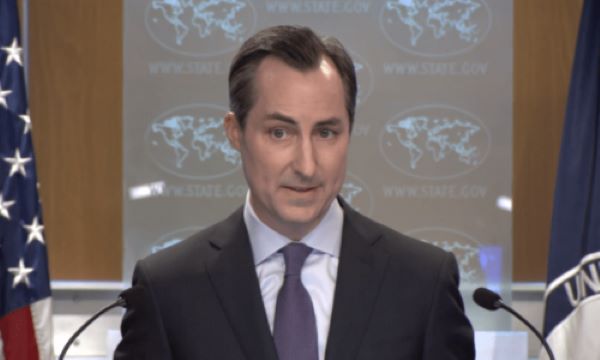
WASHINGTON: The US State Department urged India and Pakistan on Monday not to escalate tensions and resolve their disputes through dialogue.
“We have been following the media reports about this issue,” said the department’s spokesperson Matthew Miller when asked to comment on media reports that Indian government agents had carried out assassinations inside Pakistan.
“We don’t have any comment on the underlined allegations.”
The US official, however, said that while Washington was not going to “get in the middle of this situation”, it would “encourage both sides to avoid escalation and find a resolution through dialogue”.
Britain’s The Guardian newspaper reported last week that the Indian government had “assassinated individuals in Pakistan as part of a wider strategy to eliminate terrorists living on foreign soil”.
In a later report, the newspaper noted that India’s Defence Minister Rajnath Singh, in a recent statement, confirmed that his government carried out extrajudicial killings in Pakistan.
Responding to another question, Mr Miller said the US secretary of state spoke with Pakistan’s foreign minister on Friday to “reaffirm our robust partnership which advances the prosperity of Pakistan and the US.”
The two diplomats discussed the importance of continued cooperation on counterterrorism, expanding trade and investment partnership, and advancing women’s economic security and empowerment, Mr Miller added.
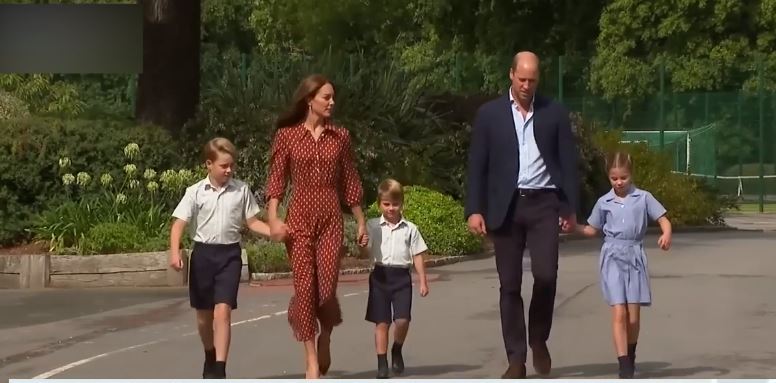
Prince William’s Duchy of Cornwall spokesperson has reacted after King Charles plans to build an ideal town in Kent have seemingly landed the Prince of Wales in trouble.
According to reports, King Charles, who is currently undergoing cancer treatment, plans to build an "ideal town" have been met with a backlash by residents.
The Telegraph per Daily Mail, reported locals have lashed out at Duchy of Cornwall plans proposed by the then Prince of Wales King Charles in 2018 for 2,500 homes on 320 acres of farmland which they fear will 'swallow up historic villages into an urban mass'
As per the royal tradition, the Duchy is passed to the eldest son of a reigning British monarch.
Now, commenting on the backlash, a spokesman for the Duchy of Cornwall told The Telegraph: “South-east Faversham will, if planning permission is granted, follow in the footsteps of Poundbury, Nansledan and other sustainable Duchy developments and become one of the most environmentally friendly neighbourhoods in the United Kingdom.”
The future king’s representative further said “It will prioritise access to green spaces, sustainable transport and will focus on the community's needs – including affordable housing and a new primary school as well as new traffic infrastructure and healthcare services.”
“New green spaces including meadows, orchards, allotments and woodland means biodiversity is set to increase by 20 per cent while a focus on sustainable travel and building a walkable neighbourhood is expected to generate 20 per cent fewer car trips compared to similar-sized communities,” the spokesperson noted.
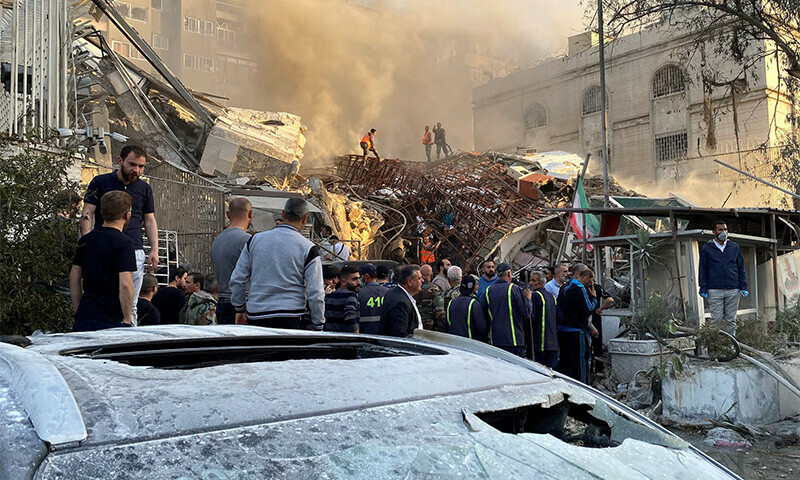
The United States is on high alert and preparing for a possible attack by Iran targeting Israeli or American assets in the region in response to Israel’s strike on the Iranian consulate in Syria, a US official has said.
“We’re definitely at a high state of vigilance,” the official said on Friday, confirming a CNN report that said an attack could come in the next week.
Suspected Israeli warplanes bombed Iran’s consulate in Damascus on Monday in a strike that killed an Iranian military commander and marked a major escalation in Israel’s war with its regional opponents.
Iran’s Islamic Revolutionary Guard Corps has said that seven Iranian military advisers died in the strike, including Mohammad Reza Zahedi, a senior commander in its Quds Force, which is an elite foreign espionage and paramilitary arm.
Iran has said it reserves the right “to take a decisive response.”
US President Joe Biden discussed the threat from Iran in a phone call on Thursday with Israeli Prime Minister Benjamin Netanyahu.
“Our teams have been in regular and continuous contact since then. The United States fully supports the defence of Israel against threats from Iran,” a senior Biden administration official said.
In the Israeli strike, part of Iran’s consulate was flattened by what was described as an Israeli air strike, a startling apparent escalation of conflict in the Middle East that would pit Israel against Iran and its allies.
The Israeli air strikes destroyed the Iranian embassy’s consular annex, killing and wounding everyone inside, Damascus said as Iranian state TV reported a Revolutionary Guards commander among the dead.
Monday’s attack was the first time the vast embassy compound itself had been hit, and comes amid soaring tensions over Tel Aviv’s war in Gaza and intensifying violence between Israel and Iran’s allies.
UK-based war monitoring group the Syrian Observatory for Human Rights said eight people, including several Guards members, were killed when “Israeli missiles… destroyed the building of an annex to the Iranian embassy”.
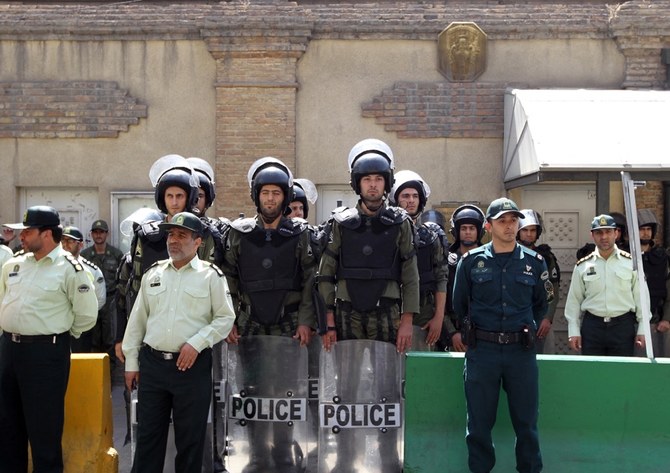
At least five Iranian security personnel have been killed in two attacks claimed by a militant group in the Sistan-Baluchistan province, state media reported on Thursday.
“Five member of the Islamic Revolutionary Guard Corps and the police died as martyrs during two night-time terrorist attacks against a Guards base in Rask and a police post in Chabahar,” Majid Mirahmadi, vice minister of the interior, told state TV.
General Mohammad Pakpour, who heads the Guards’ land forces, said on television that 15 attackers were killed during clashes with security forces. Mirahmadi said more than 10 security force members were hurt during the clashes that began Wednesday evening.
The Jaish al-Adl (‘Army of Justice’ in Arabic) claimed the attacks on its Telegram channel. Formed in 2012, the organisation is listed as a “terrorist” group by Iran and also by the United States.
Jaish al-Adl claimed an attack in December that killed 11 officers, one of the deadliest attacks in years, at a police station in Sistan-Baluchistan’s city of Rask.
The group claimed another police station attack in Rask that killed one officer on January 10.
A week later, Iran said it retaliated with missiles and drones against Jaish al-Adl over the border in Pakistan. Pakistan then carried out retaliatory air strikes against “hideouts used by terrorist organisations”.
The rare cross-border fire added to regional tensions during the Israel-Hamas conflict in the Gaza Strip, but by late January the two countries sought to ease tensions.
Impoverished Sistan-Baluchistan province, which also borders Afghanistan, is one of the few mainly Sunni provinces in Shia-dominated Iran.
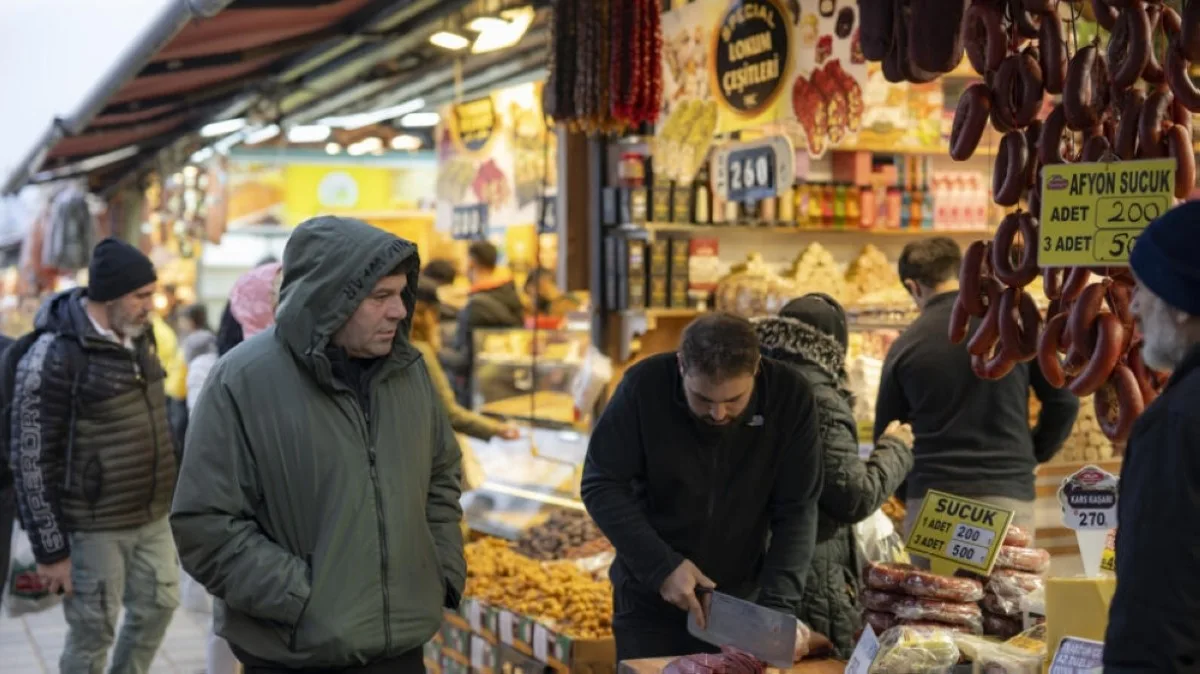
PARIS: As the euphoria of a municipal election drubbing for President Recep Tayyip Erdogan ebbs, Turks are left watching their wallets with inflation that has sapped the longtime leader’s appeal driving up costs for everyday basics.
Even as the government vows austerity measures and the central bank hikes rates, price growth “is not stopping, it’s going up”, said economist Murat Sagman, founder of Sagam Strategy Advisory.
Official data released Wednesday put year-on-year price growth at 68.5 percent in March, up from 67.07 the previous month. ENAG, a group of independent economists, said their own calculations put the annual figure at almost 125 percent and rising. “In the market, (it’s) one price in the morning, another price in the evening. I can’t make a living if I sell this corn at a cheaper price,” said Osman Karakoc, 64, selling grilled cobs for 30 lira ($0.93) apiece from a small cart outside a mosque at Istanbul’s Egyptian Market.
“It’s the product of our country, but we can hardly buy it,” he added. Erdogan, in power since 2003, was once feted for Turkey’s economic success story, but in recent years it has become his Achilles heel.
Some of the surge in price growth over recent years was down to Erdogan’s unorthodox views on monetary policy. The Islamic conservative president long blamed inflation on high interest rates, whereas mainstream economists see increasing the cost of borrowing as a way to brake activity and thereby ease pressure on prices. More recently, Erdogan has allowed Turkey’s central bank to hike its main policy rate from just 8.5 percent before his re-election last May to 50 percent last month.
But the monetary authority lists other factors still feeding inflation, including a weak lira currency—down 40 percent against the dollar in a year -- a massive jump in the minimum wage in January and surging costs for food and fuel. The government must follow through on its promises to slash spending to flank the central bank’s efforts to slow price growth, Sagman said.
“It’s the only way to lower inflation, to make the whole policy tight for a certain period of time,” he said. Nicholas Farr of Capital Economics commented that “further monetary tightening lies in store... a more concerted effort to tighten fiscal policy will be needed too”.
“We will do whatever is necessary until we reach our goal of price stability, which is our top priority,” Finance Minister Mehmet Simsek said Wednesday. Shoppers at Istanbul’s Egyptian Market were emphatic about feeling the pinch. Many browsing the stalls piled high with olives, fish, cheese and spices were pensioners living on incomes of around 10,000 lira per month.
“I have been voting for Erdogan for as long as I can remember... we trusted Tayyip and turned a blind eye to everything, but enough is enough,” said Leyla Duman, a housewife in her 60s wearing an Islamic headscarf with sunglasses and a long coat. “They give 10,000 lira to pensioners: should people pay their rent or pay their bills with it?” she asked. Her husband Serif, a 63-year-old working at the highways authority, said that he “cannot retire out of fear” as the basic pension “is not enough”.
The couple showed off two small plastic bags of shopping they said had cost them 3,000 lira, with items including 100 grams (3.5 ounces) of coffee and toys for their granddaughter. “Our money is melting every day,” Serif said.
One factor in Erdogan’s favor is the lack of elections until Turks next vote for their president in 2028, offering a window for potentially painful steps to restrain price growth. “We have a lot of time to make all the structural reforms” but “I think we’re going to see a slowdown in the economy” with high rates and tight spending, economist Sagman said. The challenge for the central bank and finance ministry is “to go to a soft landing (rather) than go to a hard landing,” he added. Such terms draw a distinction between clamping down on price growth without completely slamming the brakes on activity, versus inflation-fighting measures triggering a severe recession. — AFP
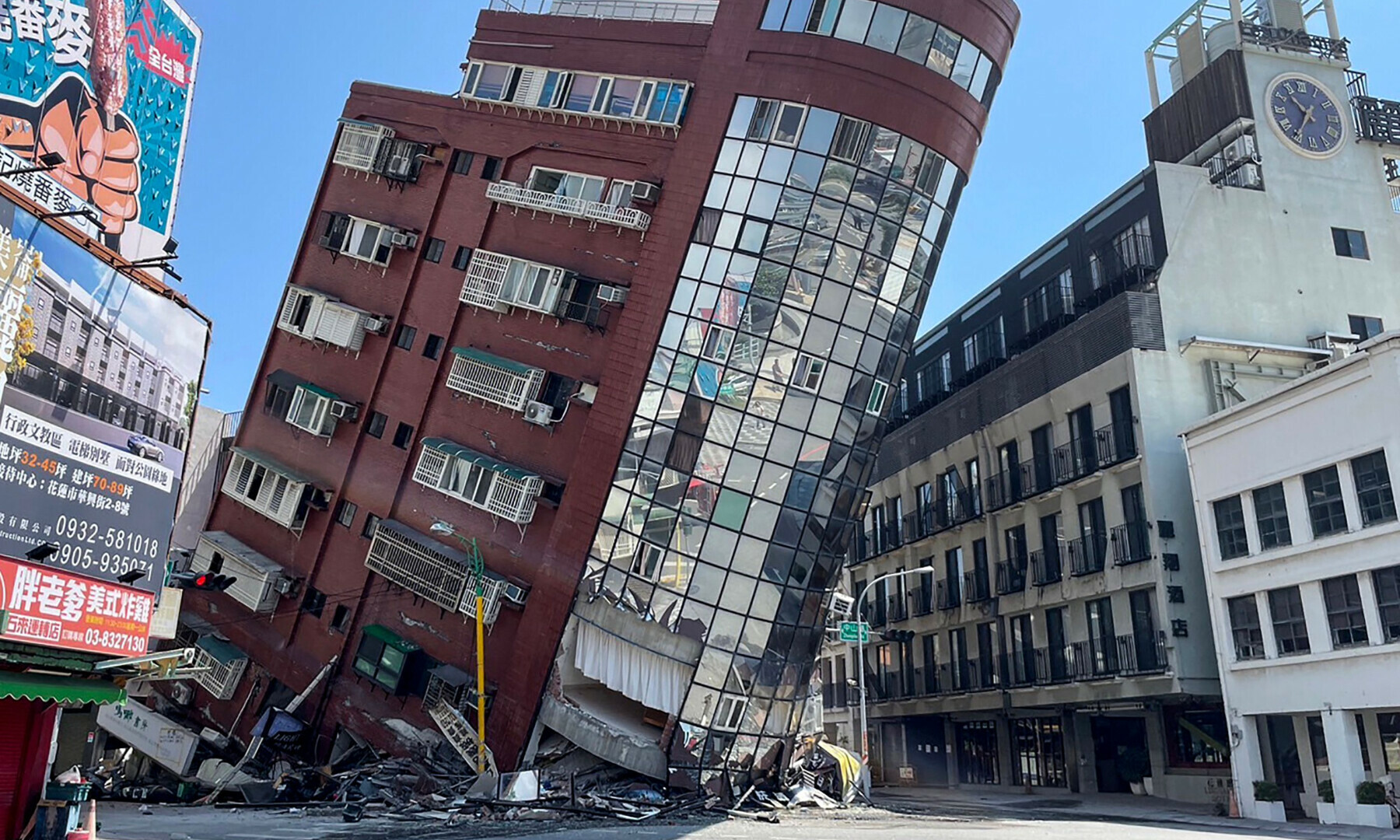
At least four people were killed and nearly 60 injured on Wednesday by a powerful earthquake in Taiwan that damaged dozens of buildings and prompted tsunami warnings that extended to Japan and the Philippines before being lifted.
Officials said the quake was the strongest to shake the island in decades, and warned of more tremors in the days ahead.
“The earthquake is close to land and it’s shallow. It’s felt all over Taiwan and offshore islands,” said Wu Chien-fu, director of Taipei’s Central Weather Administration’s Seismology Center.
Strict building regulations and disaster awareness appear to have staved off a major catastrophe for the island, which is regularly hit by earthquakes as it lies near the junction of two tectonic plates.
Wu said the quake was the strongest since a 7.6-magnitude struck in September 1999, killing around 2,400 people in the deadliest natural disaster in the island’s history.
Wednesday’s magnitude-7.4 quake struck just before 8am local time (12am GMT), with the United States Geological Survey (USGS) putting the epicentre 18 kilometres south of Taiwan’s Hualien City, at a depth of 34.8km.
Three people among a group of seven on an early-morning hike through the hills that surround the city were crushed to death by boulders loosened by the earthquake, officials said.
This photo taken by Taiwan’s Central News Agency (CNA) on April 3 shows a damaged building in Hualien, after a major earthquake hit Taiwan’s east. — AFP
Separately, a truck driver died when his vehicle was hit by a landslide as it approached a tunnel in the area.
Social media was awash with shared videos and images from around the country of buildings swaying as the quake struck.
“I wanted to run out, but I wasn’t dressed. That was so strong,” said Kelvin Hwang, a guest at a hotel in the capital, Taipei, who sought shelter in the lift lobby on the ninth floor.
Dramatic images were shown on local TV of multi-storey structures in Hualien and elsewhere tilting after it ended, while a warehouse in New Taipei City crumbled.
Local TV channels showed bulldozers clearing rocks along roads to Hualien, a mountain-ringed coastal city of around 100,000 people that was cut off by landslides.
President Tsai Ing-wen called for local and central government agencies to coordinate with each other, and said that the national army would also be providing support.
The National Fire Agency confirmed the death toll, adding nearly 60 people had been treated for quake-related injuries.
Regional impact
In Taiwan, Japan and the Philippines, authorities initially issued a tsunami warning but by around 10am (2am GMT), the Pacific Tsunami Warning Center said the threat had “largely passed”.
This photo taken by Taiwan’s Central News Agency (CNA) on April 3 shows emergency workers assisting a survivor after he was rescued from a damaged building in New Taipei City, after a major earthquake hit Taiwan’s east. — AFP
In the capital, the metro briefly stopped running but resumed within an hour, while residents received warnings from their local borough chiefs to check for any gas leaks.
Taiwan is regularly hit by earthquakes as the island lies near the junction of two tectonic plates, while nearby Japan experiences around 1,500 jolts every year.
Across the Taiwan Strait, social media users in China’s eastern Fujian province, which borders Guangdong in the south, and elsewhere said they also felt strong tremors.
Residents of Hong Kong also reported feeling the earthquake. China, which claims self-ruled Taiwan as a renegade province, was “paying close attention” to the quake and “willing to provide disaster relief assistance”, state news agency Xinhua said.
Fabrication at Taiwan Semiconductor Manufacturing Company — the world’s biggest chip maker — was briefly interrupted at some plants, a company official told AFP, while work at construction sites for new plants was halted for the day.
The vast majority of quakes around the area are mild, although the damage they cause varies according to the depth of the epicentre below the Earth’s surface and its location.
The severity of tsunamis — a vast and potentially destructive series of waves that can move at hundreds of kilometres per hour — also depends on multiple factors.
Japan’s biggest earthquake on record was a massive 9.0-magnitude undersea jolt in March 2011 off Japan’s northeast coast, which triggered a tsunami that left around 18,500 people dead or missing.
The 2011 catastrophe also sent three reactors into meltdown at the Fukushima nuclear plant, causing Japan’s worst post-war disaster and the most serious nuclear accident since Chernobyl.
Japan saw a major quake on New Year’s Day this year, when a 7.5-magnitude tremor hit the Noto Peninsula and killed more than 230 people, many of them when older buildings collapsed.
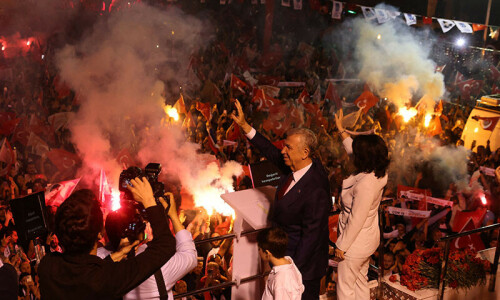
ISTANBUL: Turkiye awaited results from municipal elections on Sunday, with all eyes on Istanbul, the national “jewel” that President Recep Tayyip Erdogan has aimed to pry away from the opposition.
Ekrem Imamoglu, incumbent Istanbul mayor and the candidate from Turkiye’s main opposition secular Republican People’s Party (CHP), said on Sunday that he was “very happy” with the initial results of the mayoral elections in the country’s largest city, with nearly 40pc of votes counted.
Separately, incumbent Ankara Mayor Mansur Yavas, who is also running for re-election from the CHP, declared victory according to initial results, which showed him leading his rival from the ruling AK Party by nearly 20pc.
The election took place against the backdrop of raging inflation and massive devaluation, with the uncertainty weighing down on many voters.
Opposition inching ahead, declares victory in Ankara
“Everyone is worried about the day to day” 43-year-old Guler Kaya said at an Istanbul station. “The crisis is swallowing up the middle class, we have had to change all our habits,” she said.
“When Turkish people vote, the situation in the kitchen or on their plate changes the voting trend,” Ali Faik Demir, a political scientist at Galatasaray University, told AFP.
Vote change happens “when we cannot afford a living, when we cannot eat”, he said.
Erdogan may not have been a candidate in the municipal vote, but he dominated the campaign.
His road to power in Turkiye began in Istanbul when he was elected mayor of the mythic city straddling Europe and Asia in 1994.
His allies held the city until five years ago, when Imamoglu wrested control of the nation’s economic powerhouse.
If Imamoglu retains his seat, he will likely be the main opponent to Erdogan’s ruling AKP party in the next presidential elections in 2028.
But if Erdogan wins back Istanbul and Ankara, he will have an incentive to “amend” the constitution to stand for re-election for a fourth term, warned Bayram Balci, political scientist at Sciences Po university in France.
As soon as Erdogan clinched re-election as president last May — a post he has held since 2014 — he launched the battle to reclaim the city of 16 million people.
“Istanbul is the jewel, the treasure and the apple of our country’s eye,” the 70-year-old leader said at a recent rally in the city. Erdogan named former environment minister Murat Kurum as his mayoral candidate for Istanbul, painting Imamoglu as a “part-time mayor”.
“This election will mark the beginning of a new era for our country,” Erdogan said after casting his vote in Istanbul at midday on Sunday.
“Whoever wins Istanbul, wins Turkiye,” Erman Bakirci, a pollster from Konda Research and Consultancy, recalled Erdogan once saying.
In the run-up to the election, Imamoglu has defended his record and has focused on local issues: “Every vote you give to the CHP will mean more metros, creches, green spaces, social benefits and investment.”
After casting his vote with his family in Istanbul around midday Sunday, Imamoglu emerged to applause and chants of “Everything will be fine”, his 2019 election slogan.
“Today is an emotional day for me,” Imamoglu said in the garden of a school polling station.
The election is being held with inflation at a whopping 67 per cent and with a massive devaluation of the lira, which slid from 19 to a dollar to 31 to a dollar in one year. Analysts say this could work in favour of the opposition.
Armed clashes were reported in Turkiye’s Kurdish-majority southeast, leaving one dead and 12 wounded, a local official told AFP.
The pro-Kurdish DEM party said it had identified irregularities “in almost all the Kurdish provinces”, in particular through suspicious cases of proxy voting.
Observers from France were also refused access to a polling station in the region, according to the lawyers’ association MLSA.
Fractured opposition
Some 61 million voters were eligible to cast ballots to choose mayors across Turkiye’s 81 provinces, as well as provincial council members and other local officials.
The opposition has been fractured ahead of the polls, in contrast with the local elections five years ago.
This time around the main opposition party, the social democrat CHP, has failed to rally support behind a single candidate.


